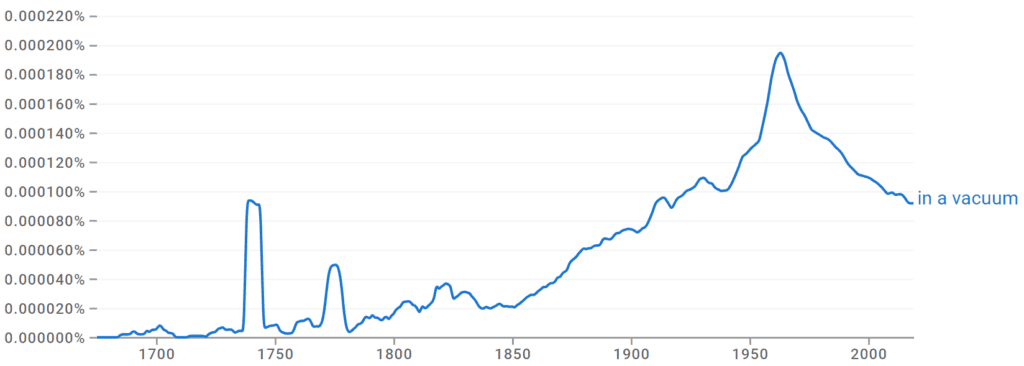To be in a vacuum means that something is cut off from other influences or links to the outside world. It is often used to criticize a person or situation by highlighting how out of touch they are with things around them. For example, if you are frustrated with how a person in charge treats their subordinates, you might exclaim, “Unless you live in a vacuum, you should have noticed our employees have been grieving the loss of their colleague!”
The expression is an idiom, which means that its meaning is figurative and used to add emphasis or further a connection to an author’s message. Most idioms have strong literal origins but, through the years, have been associated with other uses within the English language.
This article explores the definition of in a vacuum, its origins, and examples so you can better use it within your own work.
In a Vacuum Meaning Explained

If something is in a vacuum or exists in a vacuum, it stands alone, is cut off from other influences, or is without links to the outside world. Something or someone that exists in a vacuum is totally isolated in their actions or thoughts towards others.
Often, the term is used negatively to admonish someone that his or her actions affect others. It also highlights a person’s isolation or loneliness from the world around them.
For example:
- I felt like I existed within a vacuum after moving to my new school.
- Your tone-deaf behavior indicates you must live in a vacuum.
The expression can also be used to highlight that it is obvious that things have taken place with an emphasis on awareness.
For example:
- Their new business’s quick growth and success didn’t happen in a vacuum; it was a combination of community effort and sponsorship investment.
Origins of the Phrase ‘in a Vacuum’

“Vacuum” comes from Latin and simply means “empty space.” Way back in the 1540s, people used it to talk about an empty area with nothing in it. By the mid-1600s, scientists started showing they could make a vacuum. Before that, people just thought about vacuums as a big idea, not something real.
Nowadays, while “in a vacuum” can still mean the science-y thing, most people use it as a cool way to say someone or something is out of touch with the real world.
Let’s Review
The phrase in a vacuum still has literal uses in the scientific community. Still, the expression is often used idiomatically to emphasize that something stands alone or is cut off from its surroundings.
In a vacuum is often used to admonish or criticize somebody who is considered out of touch with the things around them. It can also be used to indicate isolation or even loneliness as well when a person feels isolated from their environment.
Check out some others we covered:
